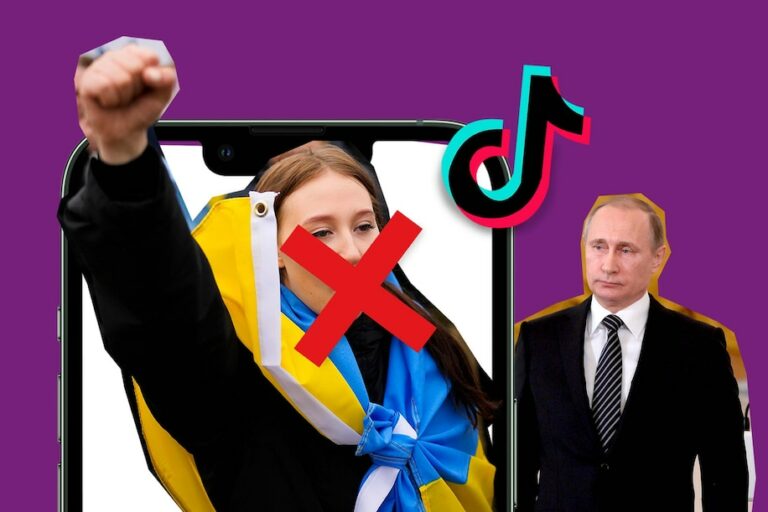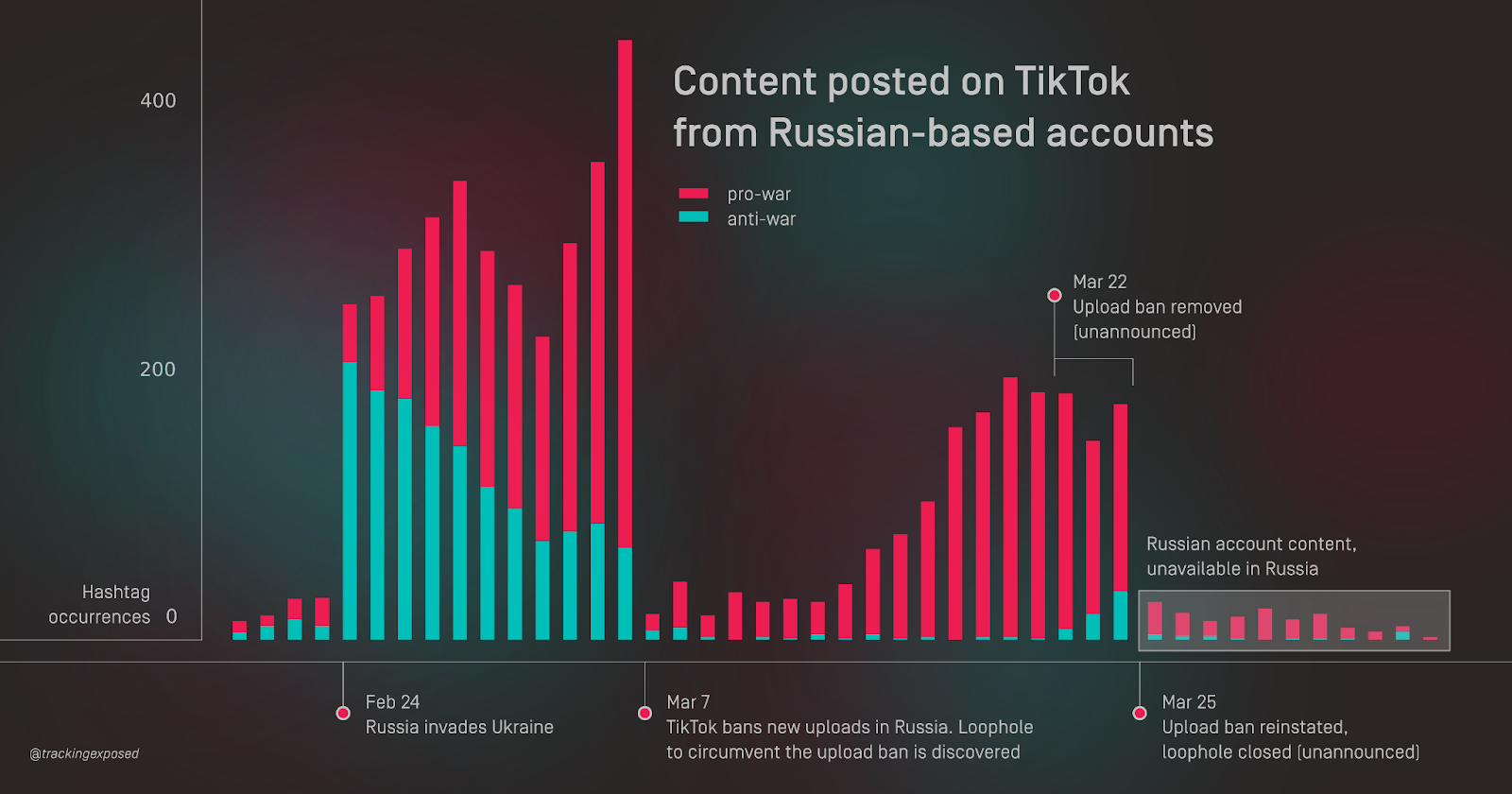Despite TikTok’s attempts to restrict pro-war propaganda in Russia, according to a recent analysis by nonprofit group Tracking Exposed, the social media tiktok suspends russia company’s platform in the country is awash with pro-war propaganda backing the country’s invasion of Ukraine.
TikTok is the remaining worldwide social media network still running in Russia, after the Kremlin blocked Facebook, Twitter, and Instagram. It declared on March 6 that it has stopped new uploads in reaction to Russia’s invasion of Ukraine, in order to protect users from the Russian “fake news” law. However, according to a fresh report, the restriction was imposed inconsistently; new material uploads connected to the conflict outweighed anti-war content by a factor of ten; and pro-war postings currently dominate TikTok’s war-related content. This has essentially frozen the platform in time after the ban was completely implemented, leaving Russian TikTokers in the dark about subsequent developments.
TikTok, a popular social video network, stated on March 6 that all new uploading and live-streaming for Russian users will be suspended. The bold action comes amid the escalating conflict in Ukraine, which began on February 24 when Russian forces entered. “We have no option but to halt live-streaming and new material to our video service in light of Russia’s new ‘fake news’ law,” TikTok tweeted on its official Twitter account, “while we assess the safety implications of this law.” Users’ in-app communications will continue to work, according to the business.
On March 4, Vladimir Putin’s government enacted a new legislation targeting the dissemination of “false information” about Russia’s military as part of a crackdown on free expression in the country. The law makes it illegal to publish whatever the Russian government considers to be false information, and it Tik Tok video carries a 15-year jail penalty.
Reasons Of War
The TikTok war
The war’s most important platform has been TikTok. Because Ukrainians have used the app to capture the reality on the ground, the conflict in Ukraine has been dubbed “the world’s first TikTok war” by TikTok Russia banned The New Yorker.
ByteDance, the Chinese business that owns TikTok, has consistently refuted charges of censorship on behalf of Beijing. Musical.ly has become a cultural tour de force throughout the world after ByteDance purchased it in 2017 and integrated it with TikTok. It just tiktok suspends russia topped 1 billion worldwide users, which is astounding given that it is not available in China and is banned in India.
Russia’s war on information
Russia’s fake news law is a significant step for a country whose administration is already hostile to free press values. Because of the arrest of journalists, harassment operations against Kremlin critics, and interest in regulating the internet, the advocacy group Reporters Without Borders ranks Russia 150th out of 180 countries for press freedom. CNN and Bloomberg News have also stopped broadcasting in Russia in recent days, while The Washington Post has deleted writers’ bylines from stories for fear of their Russian TikTok guy safety.
The nation has taken serious measures to prohibit Facebook, Twitter, and YouTube, but TikTok has beaten Russia to the punch. The end result is the same: Russian citizens, whether pro- or anti-Kremlin, will be shut out of another window into the real-life repercussions of Putin’s war.
Safety is the priority
Pro-government accounts in Russia, on the other hand, have been able to exploit flaws in the platform that allow them to continue publishing, thereby confining fresh sources of information regarding the invasion of Ukraine to Kremlin-approved channels, according to the researchers. “With these recent developments, TikTok risks effectively transforming itself into a Kremlin propaganda conduit,” the paper said.
We have no option but to halt livestreaming and new material to our video service in Russia in light of Russia’s new ‘fake news’ law, while we assess the law’s safety consequences,” TikTok added. However, according to Tracking Exposed, the platform’s choice to implement measures that go “above and beyond” the requirements of Russia’s new law may have an influence on popular support for TikTok russia office the war.
“The result of TikTok’s adjustments since the beginning of the war is that Russians are deprived of a global perspective on Russia’s actions in Ukraine, and can only view content significantly weighted toward Kremlin-approved information.” This makes it less probable that Russian public opinion will turn against the conflict, according to Salvatore Romano, the chief of research at Tracking Exposed.
The rise of the ‘splinternet’
The apparent move by TikTok to censor the information available to Russian users – who account for roughly 5% of the platform’s total user TikTok Russia-Ukraine base – points to the rise of the so-called’splinternet,’ in which platforms control content depending on particular country laws. Bytedance, the founder of TikTok, is familiar with the notion. In China, the Beijing-based business already runs a similar version of the video-sharing software known as Douyin.
Tracking Exposed evaluated a sample of war-related hashtags on TikTok and looked at the volume of content submitted between February 20 and April 5 in its “Tracking Exposed Special Report: Content Restrictions on TikTok in Russia Following the Ukrainian War.” Based on this sample, Tracking Exposed believes that 42 percent of war-related content was anti-war before the ban was announced, whereas 58 percent was pro-war. Following the prohibition, 93.5 percent of all war-related information was pro-war, with only 6.5 percent being anti-war.
In addition, the group discovered that the prohibition had been imposed incorrectly. Content might still be posted in Russia between March 7 and March 24. As a result, pro-war content on TikTok outnumbers anti-war stuff. In comparison to before the ban, there was 10 times more pro-war content posted for every anti-war video. Tracking Exposed discovered two flaws in TikTok’s content-posting ban: one was its inadequate implementation, and the other was the ability to upload via TikTok’s online version.
According to the organisation, fresh uploads in Russia are no longer feasible as of March 25, and content from outside Russia is now completely restricted, allowing pro-war propaganda to dominate. TikTok first announced the block on new uploads to tiktok suspends russia protect its Russian customers from the Russian “fake news” law, which considers posting anything incorrect about the Russian army in Ukraine a crime punishable by up to 15 years in prison.
TikTok followed Meta, Twitter, and YouTube in blocking Russian state-backed material from the European Union and labelling state-backed media across the world last week. The tech platforms have been caught in the centre of the invasion’s information battle, with Ukrainian authorities and US and European officials urging them to break ties with Russia, while Russia encourages TikTok russia APK them to block their material.
TikTok has being used by millions of people to get live information and video snippets of the violence in Ukraine. The organisation has had to cope with a deluge of recordings, some of which claim to depict activity on the ground but are unconfirmed. As a result, some people are worried that TikTok is spreading false information about the invasion.
According to The New York Times, films with the hashtag #Ukrainewar have received about 500 million views on TikTok, with some of the most popular videos receiving up to a million likes. The #Ukrainewar hashtag on Instagram, on the other hand, had 125,000 posts and the most popular videos had tens of thousands of views. Last week, TikTok said that it has increased its resources committed to monitoring for war-related misinformation It’s tough to turn down livestreaming and fresh uploads from Russia since it would impede regular Russians from distributing independent information. Some Russian journalists and censorship experts have cautioned that blocking tech sites in Russia would have harmful implications.
TikTok Alternatives For Video Sharing
Not everyone is a fan of TikTok. Some users are concerned about the app’s security, while others just dislike it and will never use it. That’s OK. TikTok, on the other TikTok alternatives hand, is unbeatable for producing and sharing videos, particularly short-form pieces with filters, music, and other effects applied. Fortunately, there are applications that aim to replicate the experience.






